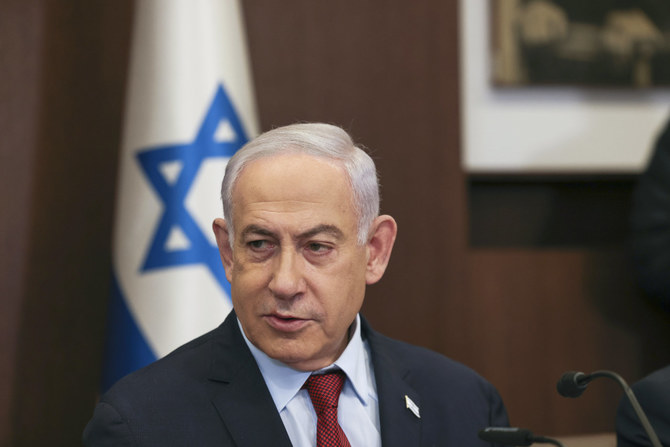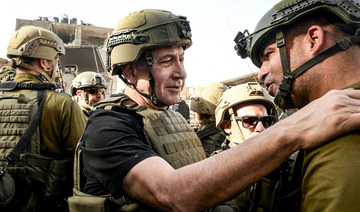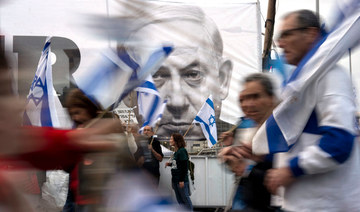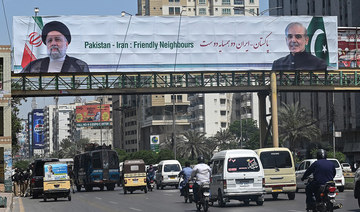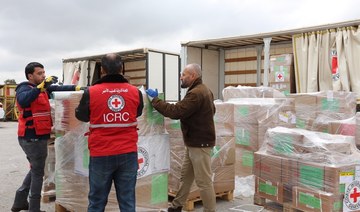LONDON: Hopes for a peaceful resolution to the conflict between Israel and the Palestinian militant group Hamas are contingent upon a change of leadership at the top of the Knesset, as it seems incumbent Prime Minister Benjamin Netanyahu is convinced peace is not an option.
That, at least, is the view of several experts, who believe Netanyahu’s obsession with seeing the decades-old conflict between Israel and the Palestinians as something that can only be managed, not brought to an end, has impeded all other alternatives.
“Netanyahu is irrelevant to peace,” Yossi Mekelberg, professor of international relations and associate fellow of the MENA Program at Chatham House in London, told Arab News.

Smoke rises following an Israeli bombardment in the Gaza Strip, as seen from southern Israel on Monday, on Dec. 11, 2023. (AP)
Mekelberg is of the view that Israel should be “looking for a future leadership,” adding that, despite not being in the “actioning peace” phase of the conflict, this would have to “start soon, if we don’t want another prolonged period of low intensity war.”
Despite having developed a reputation for survival and rebirth over his 20-plus years at the top of Israeli politics, Netanyahu’s poll numbers indicate his ouster in the near term is now a very real possibility.
Given the corruption charges awaiting him once he is stripped of the legal immunity afforded by high office, the stakes are particularly high.
A recent report by The Wall Street Journal found that support among Israelis for Netanyahu to remain in office for the long haul stands at just 18 percent, with 29 percent demanding he leave now and 47 percent seeing no place for him in government after the war ends.

Interviewed by The New Yorker, Dahlia Scheindlin, a political scientist and expert on Israeli public opinion, said that Netanyahu’s popularity had reached its nadir.
“By every possible indicator we have, and there have been lots of surveys done since Oct. 7, his popularity is abysmal,” said Scheindlin. “It’s the worst I’ve seen, certainly since 2009. I’d like to say ever, but I would have to check every single survey since the early 90s.”
That decline could have implications for how the war in Gaza is fought, with Netanyahu’s coalition, built in 2022, having lost its majority, dropping from 64 to 32 seats in parliament.

Israelis protest in Tel Aviv on December 15 following an announcement by the military that they had mistakenly killed three Israeli hostages being held in Gaza by Hamas militants. (REUTERS)
And yet, part of that loss of public support stems from the manner in which Netanyahu has sought to manage the conflict with Hamas, with many Israelis blaming his failure of leadership for the attack that set off the latest phase of violence.
Osama Al-Sharif, a Jordanian analyst and political columnist, believes Netanyahu’s political fate is tightly bound up with how the war has been fought.
“A more likely scenario over Israeli plans for the demilitarization of Gaza is that Netanyahu himself leaves the scene before Hamas does as the public begin to complain of the victory that may never come,” Al-Sharif told Arab News.
Opinion
This section contains relevant reference points, placed in (Opinion field)
And it is not just Israeli voters who seem to be running out of patience. US President Joe Biden’s support for Netanyahu and his hard-right government’s handling of the war have put him on the back foot as he moves into his own election year.
In off-camera remarks reported by Axios, Biden is reported to have said: “I think he (Netanyahu) has to change, and with this government. This government in Israel is making it very difficult for him to move.”
For Tobias Borck, senior research fellow for Middle East security at London’s Royal United Services Institute, Netanyahu has been hamstrung from the start by his own perception of the conflict with the Palestinians, with his “manageable conflict status quo” having proved a failed strategy.
“His intransigence on only viewing Palestine as a problem to be managed is what’s impeding the emergence of new ideas,” Borck told Arab News.

Palestinians look for survivors of the Israeli bombardment of the Gaza Strip in Rafah on Dec. 12, 2023. (AP)
It has created “this completely unsustainable middle thing: Neither one state, nor two states. It is not a solution to the problem. It is a confusion caused by the position Netanyahu adopted decades ago. That he has not come up with new ideas isn’t surprising.”
Following a seven-day truce, during which Hamas released several hostages in exchange for Palestinians held in Israeli jails, the IDF’s bombing campaign resumed, bringing the civilian death toll in Gaza to more than 18,000, according to the Hamas-run health ministry.
Against this backdrop, several unnamed sources who spoke to US media have said that Washington may try to force Israel’s hand and impose an end to the violence by Christmas. Borck said he has heard these rumors, but is not convinced of their veracity.
What has become quite clear is that “the American tone is shifting and it is turning from open-ended to wanting it over,” he said.
“You can trace the shift over the past two months. The shift is continuing, and the end point is inevitable: Ceasefire now. All that matters is what the Americans perceive as the Israelis having achieved their war aims. Remember there are Americans still held hostage.”

Palestinians salvage their belongings after an Israeli strike in Rafah, Gaza Strip, on Dec. 13, 2023. (AP)
Borck does not expect Israelis to simply lay down their arms the moment Washington barks “ceasefire now.” Instead, he expects to see them challenge and condemn a perceived US interference.
However, Washington’s change of tone could actually be Netanyahu’s best opportunity for political survival. Reuters has cited recent polling that indicates overwhelming public support for the war, despite the civilian death toll in Gaza.
One former Israeli ambassador to Washington, Itamar Rabinovich, told The New York Times that Netanyahu was focused as much on a pending election as he was on the war.
“He’s looking at a potential election campaign a few months down the road. This is going to be his platform: ‘I am the leader who can stand up to Biden and prevent a Palestinian state’,” said Rabinovich.
Biden appears to be keen on disassociating backing for Israel from support for Netanyahu. Earlier in the week, the US president said Israel was losing international support because of its indiscriminate bombing.

US President Joe Biden, shown in this photo with Secretary of State Antony Blinken (left) and Defense Secretary Lloyd Austin (right), has increasingly become impatient with the Israeli government's intransigence on the war in Gaza. (AFP/File)
Netanyahu, meanwhile, appears to be moving to identify himself in opposition to Biden, stating in recent remarks: “We are continuing until the end, there is no question. I say this even given the great pain and the international pressure. Nothing will stop us.”
Ahron Bregman, a senior teaching fellow at the Department of War Studies at King’s College London, told Arab News he was hesitant about writing Netanyahu off just yet, noting that, after 30 years of writing political obituaries, it is still too soon to say.
Echoing others who spoke to Arab News, he is also skeptical that a change in leadership at the top of Israeli politics would result in any meaningful change for Palestinians.
“It doesn’t really matter, because whoever replaces him is likely to continue with the same policies, namely using brutal force to suppress the Palestinians in Gaza and the West Bank. Israel is unlucky in that at this critical time, it doesn’t have a (David) Ben-Gurion,” he said, referring to the founder and first prime minister of Israel.

Israel’s Prime Minister Benjamin Netanyahu and his cabinet. (AFP)
It happens in the history of nations that often, at critical times, when one needs leaders who are brave, bold and able to think out of the box, they are not around.”
Bregman said that this has left Palestinians in an unenviable position, but suggested those supporting their cause would be best placed directing their energies “not so much to a long-term solution but to ensure that the Israelis, when this war is over, get out of the Gaza Strip.”
This meant also ensuring that if Israel wants a buffer zone separating it from Gaza, it will have to be built inside Israel, he said.
If, as some have suggested, the Israel Defense Forces is eying up the possibility of turning north Gaza into a buffer zone, Bregman said that any Israeli presence in the “tiny” Strip, even if only “temporary,” would only serve to “delay even further a long-term solution to the conflict.”






